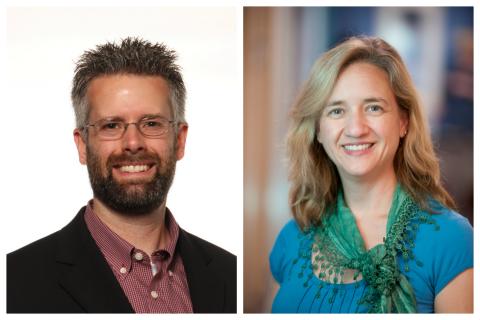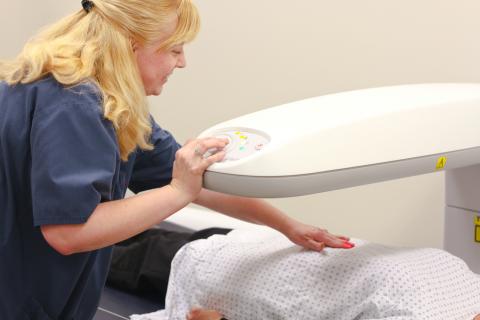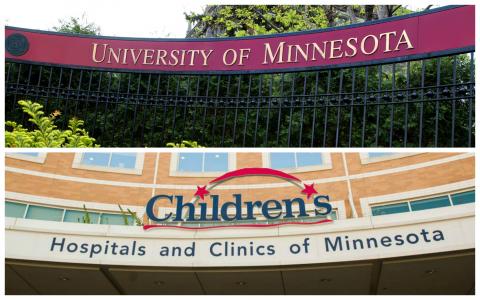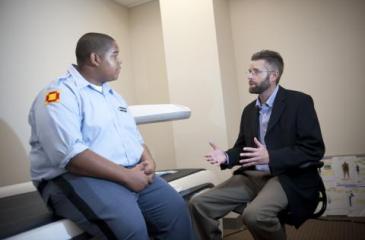The University of Minnesota’s Clinical and Translational Science Institute is committed to nurturing research collaborations between University investigators and the broader community, such as clinics, nonprofits, and other community entities.
One way CTSI accomplishes this is by awarding pilot grants to promising research projects that address important Minnesota health issues and involve individuals or groups from outside the University.
A CTSI Community Collaborative Grant enabled Aaron Kelly, PhD, and Jennifer Abuzzahab, MD – from the University of Minnesota and Children’s Hospitals and Clinics of Minnesota, respectively – to advance research that has revealed a promising way to help adolescents with severe obesity.
The co-PIs received the pilot grant in 2010, which has resulted in a multi-million-dollar grant and catalyzed the formalization of a pediatric obesity research consortium among four major health organizations in Minnesota.
Addressing an issue seen in their patients
Many severely overweight teenagers have serious conditions that typically occur with obesity, such as high blood pressure, high cholesterol, and sleep apnea. And they haven’t responded well to other weight-loss approaches that generally work for teens with moderate obesity. While bariatric surgery is effective, it’s a life-changing procedure and scientists don’t know a lot about its long-term effects.
“As physicians, we see first-hand that current approaches to weight loss simply don’t work for everyone,” says Dr. Abuzzahab, a Pediatric Endocrinologist for Children’s. “When adolescents with severe obesity rely only on lifestyle changes such as diet and exercise, the outcomes are very poor.”
There are many contributing factors as to why certain teenagers struggle with obesity to begin with, and the co-PIs believe there’s something “fundamentally different” about people who develop obesity early in their lives. They argue that while behavioral issues contribute, biological issues like genetics play a bigger role.

Filling a critical gap
This is where the joint research project comes in, as Dr. Kelly, who is an Associate Professor of Pediatrics and Medicine for the University’s Department of Pediatrics, which is affiliated with the Masonic Children’s Hospital, explains:
“Using the right medication as part of a broader treatment plan could fill a critical gap. By targeting the biological aspect of obesity, we believe we can help adolescents with severe obesity more successfully lose weight and keep it off.”
Drs. Kelly and Abuzzahab’s CTSI-funded project explored the potential of using a drug called exenatide to help treat severe obesity in teenagers. The medication, a GLP-1 agonist, is currently taken by adults with type 2 diabetes and has a “side effect” of weight loss.
Nearly two dozen adolescents with severe obesity volunteered to participate in the study. The study team recruited participants primarily through Children’s Hospitals and Clinics of Minnesota and the University of Minnesota Masonic Children's Hospital.
Participants were randomized to receive exenatide or a placebo injection for three months. This was followed by an open-label extension that gave all participants a chance to use exenatide for another three months.
Collaborating to maximize success
The University and Children’s each enrolled participants and conducted the research at their own sites following the same protocol.
To ensure the multi-site study would run smoothly and consistently across sites, the pair worked toward one another’s strengths, relied on constant communication, and even audited one another. The two naturally worked well together, due in part to their mutual respect and shared vision for treating pediatric obesity.

For Dr. Kelly, CTSI is a key resource for conducting studies:
“I conduct all of my studies within CTSI’s clinical research infrastructure, which has been invaluable to me. CTSI’s research facilities provide what I need to implement studies, from experienced, dedicated staff to state-of-the-art equipment.”
The research team also brought in CTSI’s Biostatistical Design and Analysis Center to help plan the data collection, and analyze and interpret the data they’d collected.
Uncovering a new way to help teens with obesity
Ultimately, preliminary results showed this particular drug could be a feasible, safe, and effective way to treat severe obesity.
Adolescent participants who took the drug achieved clinically significant weight loss, experiencing a -2.7 percent body mass index (BMI) reduction compared to the placebo and a cumulative 4 percent BMI reduction during the open-label period. They also saw improvements in risk factors for diabetes and heart disease.
JAMA Pediatrics published the study with an accompanying editorial, and the co-PIs also shared the results via numerous presentations and posters.
“Collaborating with the University on research helped me grow my research program, and created new opportunities for addressing the health issues my patients face,” says Dr. Jennifer Abuzzahab, who has since gone on to lead a related R01-supported study to explore if exenatide can help individuals who experience acute weight gain after brain tumor treatment.
Drs. Kelly and Abuzzahab also credit the CTSI grant for catalyzing the formalization of a research group called the Minnesota Pediatric Obesity Consortium. Prior to the CTSI grant, the group was a journal club for a handful of pediatric obesity investigators at the University, Children’s, Mayo Clinic, and Park Nicollet who talked about collaborating on research someday.
Now it is a formal consortium that aims to streamline large, multicenter research studies in the field of clinical pediatric obesity, and educate Minnesota health care providers on best practices for helping youths who are overweight or have obesity. One of the benefits of such a collaboration is that it helps pediatric obesity investigators at those institutions overcome one of research’s biggest challenges: attracting enough study participants.

Drs. Kelly and Abuzzahab’s success also inspired CTSI, Children’s, and the University’s Department of Pediatrics to create a child health-focused grant program that supports research partnerships among the organizations.
Receiving an R01
The crown jewel of their subsequent accomplishments was securing an NIH R01 award to continue their research.
“Initial funding from CTSI led to a nearly three-million-dollar NIH grant to advance our research,” said Dr. Kelly. “CTSI’s support enabled us to demonstrate the effectiveness of the treatment we’re investigating, and that further studies on the topic could be feasible, particularly in terms of attracting enough research participants.”
The grant proposal leveraged the wealth of pilot data generated from the CTSI-supported study as well as a smaller Minnesota Obesity Center-funded study.
It also emphasized the strong, sustainable collaborations that Dr. Kelly, who is this R01’s PI, established with Dr. Abuzzahab as well as two other consortium partners at Mayo and Park Nicollet. Individuals from all institutions serve as collaborators on the grant, and actively work to enroll research participants so the study can be completed.
Expanding their research
The study supported by the R01 award will be set up differently and will be much larger, aiming to attract approximately four times as many research volunteers. This time, all adolescent participants will need to lose 5 percent of their BMI over three months in order to continue with the study.
If they achieve this BMI reduction, they’ll get randomized to receive either exenatide or a placebo over the course of a year. The idea is to see if exenatide can help them keep off the initial BMI reduction, and ideally help them lose even more weight.
Over the course of the study, which will be enrolling participants until July 2019, they’ll be evaluating:
- How much weight participants are able to keep off, measured by BMI reduction.
- If participants improve risk factors for diabetes and heart disease.
- How exenatide works, to better understand precisely why it helps with weight loss.
- What the drug does to appetite and satiety signals, as measured by blood tests conducted before and after a meal.
- What the weight loss and exenatide does to their resting metabolic rate, also known as metabolic efficiency. When people lose weight, the body responds by slowing down the metabolic rate, which makes it harder to lose weight and keep it off. One of Drs. Kelly and Abuzzahab’s hypotheses is that the drug can help prevent the resting metabolic rate from dropping as much as it normally would, giving people a better chance of losing weight.
- What eating behaviors do best with this particular medication. Questionnaires will gauge participants’ eating behaviors to pinpoint why they eat, such as if they feel hungry all the time, derive more pleasure out of eating, or are susceptible to binge eating.
Forging forward
The idea of exploring whether medications could help treat pediatric obesity isn’t widespread, though that’s changing as Drs. Kelly and Abuzzahab expand their research, publish their findings, and advance their ideas forward.
“We’re at the beginning of what we hope is the next frontier for pediatric obesity research,” says Dr. Kelly. “We want to reach a point where we have viable options for adolescents struggling with severe obesity that don’t involve surgery.”
Dr. Abuzzahab adds:
“We’re trying to create a future in which physicians can more intentionally deliver the right treatment approach to the right kids that target the right areas of concern. By taking a more personalized approach, we believe can help kids and teens with obesity live better, healthier lives.”
Families of teens interested in participating in the study can contact Annie Sheldon at [email protected] or 612-626-3813. Visit studyfinder.umn.edu to explore all University of Minnesota studies that need volunteers.
